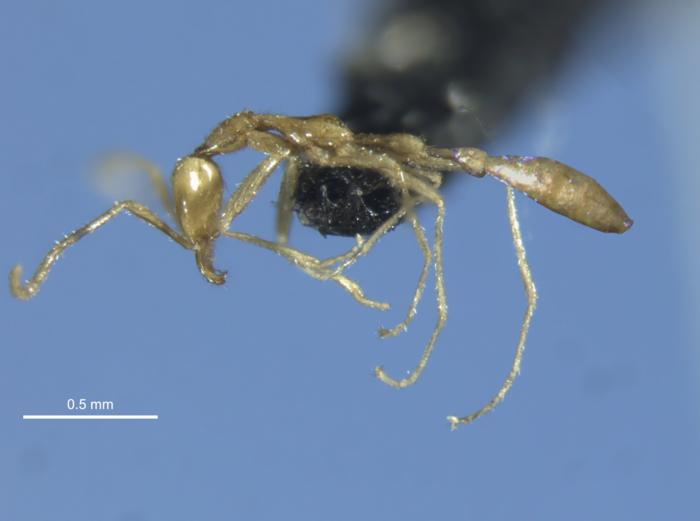In the sun-scorched Pilbara region of north-western Australia, scientists have unearthed a mysterious creature from the shadows – a new ant species of the elusive genus Leptanilla.

Credit: Mark K. L. Wong, Jane M. McRae
In the sun-scorched Pilbara region of north-western Australia, scientists have unearthed a mysterious creature from the shadows – a new ant species of the elusive genus Leptanilla.
The new species, Leptanilla voldemort – L. voldemort for short – is a pale ant with a slender build, spindly legs, and long, sharp mandibles. The species name pays homage to the dark wizard Lord Voldemort, the fearsome antagonist of the Harry Potter series, drawing parallels with the ant’s ghostly and slender appearance, and the dark underground environment, from which it has emerged.
Scientists Dr Mark Wong of the University of Western Australia and Jane McRae of Bennelongia Environmental Consultants describe the enigmatic new species in a paper published in the open access journal ZooKeys.
Leptanilla voldemort was discovered during an ecological survey to document animals living belowground in the arid Pilbara region of north-western Australia. Only two specimens of the bizarre new ant species were found. Both were collected in a net that was lowered down a 25-metre drill hole and skilfully retrieved while scraping against the hole’s inner surface – an innovative technique for collecting underground organisms known as ‘subterranean scraping’.
Compared to other Leptanilla ant species, L. voldemort has an extremely slender body as well as long, spindly antennae and legs. Together with its collection from a 25-metre-deep drill hole, this unusual morphology has left experts speculating as to whether it truly dwells in soil like other Leptanilla species, or exploits a different subterranean refuge, such as the air-filled voids and cracks that form within layers of rock deeper underground.
The long, sharp jaws of L. voldemort, however, leave little to the imagination.
“Leptanilla voldemort is almost surely a predator, a fearsome hunter in the dark. This is backed up by what we know from the few observations of specialised hunting behaviours in other Leptanilla ant species, where the tiny workers use their sharp jaws and powerful stings to immobilise soil-dwelling centipedes much larger than them, before carrying their larvae over to feed on the carcass” said Dr Wong, lead author of the study.
The exact prey of L. voldemort, however, is not known, though a variety of other subterranean invertebrates, including centipedes, beetles and flies, were collected from the same locality.
There are over 14,000 species of ants worldwide, but only about 60 belong to the enigmatic genus Leptanilla. Unlike most ants, all species of Leptanilla are hypogaeic – their small colonies, usually comprising a queen and only a hundred or so workers, nest and forage exclusively underground. To adapt to life in darkness, Leptanilla workers are blind and colourless. The lilliputian members of the ant world, these ants measure just 1 to 2 millimetres – not much larger than a grain of sand – allowing them to move effortlessly through the soil. Due to their miniscule size, pale colouration, and unique underground dwellings, finding Leptanilla species is a challenge even for expert ant scientists, and much of their biology remains shrouded in mystery.
While Australia boasts some of the highest levels of ant diversity in the world – with estimates ranging from 1,300 to over 5,000 species – L. voldemort is only the second Leptanilla species discovered from the continent. The first, Leptanilla swani, was described nearly a century ago – from a small colony found under a rock in 1931 – and has almost never been seen since.
With its formation beginning approximately 3.6 billion years ago, the Pilbara is one of the oldest land surfaces on Earth. Despite the scorching summers and meagre rainfall, the region harbours globally important radiations of underground invertebrates. Adding to the unique biodiversity of this ancient landscape, the discovery of the enigmatic ant L. voldemort is a testament to the wizardry of nature and the mysteries of life in the depths of darkness.
Original source:
Wong MKL, McRae JM (2024) Leptanilla voldemort sp. nov., a gracile new species of the hypogaeic ant genus Leptanilla (Hymenoptera, Formicidae) from the Pilbara, with a key to Australian Leptanilla. ZooKeys 1197: 171-182.
Journal
ZooKeys
Article Title
Leptanilla voldemort sp. nov., a gracile new species of the hypogaeic ant genus Leptanilla (Hymenoptera, Formicidae) from the Pilbara, with a key to Australian Leptanilla
Article Publication Date
11-Apr-2024



